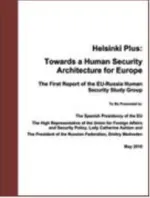Helsinki Plus: Towards a Human Security Architecture for Europe

Executive Summary
In June 2008, President Medvedev put forward a proposal for a new European security architecture. In November 2009, he published a draft European Security Treaty, which focuses on what is known as ‘hard security’ –the security of borders and the use of military force. President Medvedev’s proposals offer an opportunity to revise and revive the EU-Russia security relationship and open up a public debate within the EU and Russia about security but it should go beyond traditional concepts of hard security. We live in a more multipolar multilateral world, where global challenges like the threat of climate change and financial turmoil can have serious consequences for security, multiplying new and old risks such as xenophobia, religious fundamentalism, increased crimes rates and terror. In particular, both the EU and Russia were severely affected by the financial crisis. They need to cooperate in the modernisation of their economies and protection of the environment but this can only be achieved if they also cooperate on security.
The concept of human security encompasses the ‘three baskets’ of the 1975 Helsinki Accords. It is about the security of individuals and the communities in which they live – the third basket of Helsinki. It is about material security as well as physical security, about life threatening risks that emanate from poverty or from natural disasters and that require economic, scientific and cultural cooperation – the second basket of Helsinki. And it is about the extension of rule-governed as opposed to war-based security – the first basket of Helsinki.
A human security lens offers a different lens through which to understand some of the key components of European security. Instead of defining conflicts in terms of geo-politics or ethnic rivalry, and taking different sides,
Russia and the EU could cooperate in crisis and post-crisis management so as to enhance the human security of individuals affected by conflicts. Instead of linking weapons of mass destruction to sovereignty and pursuing arms control approaches, which tend to entrench Cold War thinking, weapons of mass destruction (WMD) should be reconceptualised as massive threats to human security. Instead of geo-political competition for energy, a human security approach to energy would focus on universal access, on combating climate change and on the stability and development of suppliers. Instead of focusing on future military attacks, a human security approach would put much more emphasis on so-called non-traditional threats such as the spread of drugs, organised crime, terrorism, or natural and man made disasters. And instead of trying to counter the rise of emerging powers, Russia and the EU should cooperate to strengthen global solutions to the global challenges of our time.
We propose an EU-Russia security dialogue that is both top down and bottom up, involving governments, international institutions, parliamentarians and civil society that could become the cornerstone of a new inclusive process throughout the Euro-Atlantic region about how to establish a human security architecture for Europe. It would cover: cooperation in crisis and crisis management, especially in the Caucasus and the Balkans; investigating how to increase freedom of movement, especially displaced persons and those who live in small unrecognised states; ways to eliminate WMD in Europe; specific transnational institutions for addressing non-traditional threats; how to achieve universal access to energy, how to open up and depoliticise energy markets, increase energy efficiency and develop renewable forms of energy, and how to diversify the economies of energy suppliers and increase transparency; how to work together on global issues and promote a global human security capacity.
To Be Presented to: The Spanish Presidency of the EU, The High Representative of the Union for Foreign Affairs and Security Policy, Lady Catherine Ashton and The President of the Russian Federation, Dmitry Medvedev.